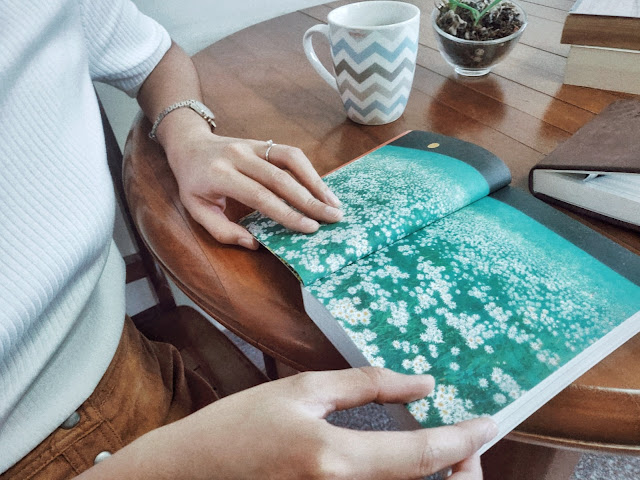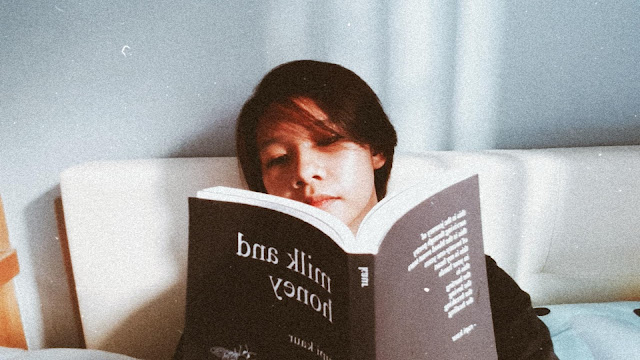How to Earn Psychological Benefits from Staying at Home - Based on Science
While some of us are already accustomed to staying at home, many people feel otherwise and flinch at the idea. I know a few of my friends, those who are more extroverted, are now feeling restless. This is probably one of the reasons why we see many attempts at easing the boredom by dancing to fun beats through an app called TikTok (I totally enjoy watching my nieces dance on TikTok, they look so adorable!) or perhaps even through cooking or watching movies. This is not wrong at all. We have many ways to cope with the situation. Instead of categorizing whether something is fun or boring, I encourage all of us to ask ourselves these questions as we try something at home: "Will I benefit from this? Will I grow my strengths from doing this? Am I able to support and uplift others through this?"
Despite the mundaneness of being indoors, there are many helpful activities we can do to promote well-being and in the long run, hone us to become better individuals and more responsible citizens in the community.
So, how exactly can we make staying indoors become more bearable and authentic? What activities can we try doing to support our growth instead of stagnation?
1. Read a book.
Reading engages our minds and expands our vocabulary. In fact, reading is also suggested to reduce stress by as much as 68%, according to one study conducted by Sussex University (The Telegraph, March 2009). Furthermore, a cognitive neuropsychologist named Dr. David Lewis shared that immersing ourselves through a book can be an ultimate form of relaxation. Sounds enticing, isn't it? It's important to relax the right way, and not just doing our usual mindless scrolling over social media. They are very different things.
One of the books I recommend, especially in the situation that we are in now is entitled: "The Things You Can See Only When You Slow Down: How to be Calm in a Busy World" by Haemin Sunim.
I got this book from Alex as an anniversary gift. I love this book because of the author's wisdom. It's a short and easy read but the content is relevant and timeless. Among the most beautiful elements of the book are the poignant illustrations in every chapter. It invites you to truly be mindful and attentive with the details.
I also like reading "Emotional Intelligence" by Daniel Goleman and "Sapiens: A Brief History of Humankind." by Yuval Noah Harari.
Even reading for at least 6 minutes will make a big difference! It's important to indulge our minds with stories from the books as it helps to enrich our imagination, which in turn can make us more creative. However, sometimes we find it hard to grab a book and start to read for many important reasons - time constraints, choice paralysis on which book to read, etc. If you are interested to know how to finally start reading again, you can read a very short and practical tip here.
So, grab a book and read away!
2. Stretch.
Do some stretches at home. Stretching helps to protect our mobility. It is also important to maintain a range of motion for our joints. If we do not stretch, we will risk having tighter and shorter muscles, resulting in more serious health hazards like joint pains, strains, and muscle damage, according to Harvard Medical School (Harvard Health Publishing). If you are well and able, please avoid lying in bed the whole day or sitting down with your mobile phones. Prolonged slouching results in a bad posture, having a bad posture means it can become difficult to move around.
In 2018, I started attending Pilates classes. Pilates is an exercise that improves our flexibility, strengthens our muscles and improves our posture and alignment. It is sometimes done on a Pilates reformer (like in the photo), on a mat, or on a trampoline (called Pilates Rebound). Once you have practiced enough basic Pilates exercises, then you can also try the Pilates Choreography.
I've only ever been to one studio because the teacher there, her name is Joey, is someone who I really trust. She is an encourager and is mindful of the way she corrects and teaches. The name of the studio is The Pilates MVMT. The best takeaway I'm learning from this experience is a wonderful appreciation for our mind and body connection.
Through Pilates and the stretching segments that come along with it, I've become more aware of my posture and my range of movement has become broader. It helps me to move with ease. You can also try doing Pilates and I will share more about my experience on another post. Meanwhile, another option you can try is yoga. But the most important thing for now, since we are in our homes is simply to stretch! To give you some ideas on how to stretch, you can refer to this page here.
Stretch, stretch, stretch!
3. Savor your cup of coffee or tea.
Savoring means to fully experience what you are doing to feel joy and extend our positive experiences. While at home, indulge yourself with a warm cup of coffee or tea (or any kind of beverage). Since we have more time to slow things down a bit, this is the perfect opportunity to practice savoring.
Psychologically, savoring helps us to build more positive thoughts and emotions, which in turn can become effective insulations against depression.
Savoring is also a mindfulness practice. Mindfulness means being fully present and aware of each moment. It entails being observant of our thoughts and feelings without labeling them as good or bad. Why is being mindful relevant? Because we are currently in a constant state of anxiety. In order to remain grounded and balanced, we have to notice the little things around us rather than the bigger things that we have no control over. So, take a sip at your warm cup of coffee, and savor the experience. Slowly. Beautifully.
4. Take a nap.
I love taking afternoon naps. However, I can only do so during the weekends when I don't have to go to work. It helps me feel recharged and I can immediately feel a boost in my energy after taking one. Naps are important because they help improve our alertness. I notice that when I miss my afternoon naps, I feel groggy and tired. In contrast, when I take my afternoon nap, I feel amazing!
The recommended napping time is within 30-40 minutes. This will give you a 90-100% level of alertness and increased performance with what you are doing, say, for example, reading, or stretching! According to the National Sleep Foundation, napping also has a psychological benefit of providing us an easy and priceless way to relax.
Make the most out of your experience at home and take a nap. Not only will it give you an energy boost, but it also means that you have helped your community against COVID-19, of course by staying home! As in the photo above from Work is Life PH, "Yung nakahiga ka lang buong araw, pero nakatulong ka sa bayan. Minsan lang to kaya galingan nyo na!"
5. Connect with the people who are important to you. Give your family members and friends a call.
Are you aware that the term "social distancing" has been revised to "physical distancing"? According to World Health Organization (WHO) epidemiologist Dr. Maria Kerkhove during a press briefing, and as cited in Reuters, using the term social distancing may imply losing our connection with our loved ones. It has been changed to physical distancing because people must still remain connected socially, through technology for example.
As human beings, we long to connect. Relationships are a big part of being human and we most especially need these relationships and connections in these trying times. So, take this chance to start creating a routine of giving your family and friends a call! Please check on them if they are okay. Other conversation topics can be about what new skills they are learning, or any habits they're starting to develop. It shouldn't only be about the virus.
How we can approach our conversations regarding the COVID-19 pandemic should be dealt with resilience and curiosity. My friend Shaleen, author of Children's Wellbeing, had an interesting conversation about the situation with his six-year-old son, Ivan. You can read the brief and substantial content here.
Do you have any relatives who are from the medical field or at the front-line industries like transportation, hygiene, etc? Then, best if you can also send them a message not to worry because you are following safety procedures, washing your hands properly, and are staying home. This will give them peace of mind and also help to make their work more bearable. Here is a beautiful image from April Dawn Ibo. You can also check her heart-warming artworks here.
6. Listen to music - uplifting music to be specific.
Music soothes the soul. I love listening to Indie Pop or Folk music. My favorite playlist on Spotify is called Alexrainbird Music. Bands like Hollow Coves, Of Monsters and Men, Iron and Wine, and WILD, are some of my go-to music artists. When I do listen to music, I'm particular with the lyrics and carefully listen to them or search it online. They are equally as important and pivotal as the hymn or tune. Music is suggested to ease our pain, decrease our stress levels, and promote positive emotions.
Alternatively, I also listen to podcasts to help me learn new things and understand different perspectives. I wrote about my recent podcast guesting in Singapore. How was my experience, you can read it here. So, whether it be listening to a piece of calming music or a valuable podcast, this activity is one of the effective ways to ease anxiety and panic! Relax, grab your listening devices and tune into the beautiful harmony of both music and learning.
7. Try journaling.
Do you agree that journaling must be done perfectly, like those Pinterest-worthy posts? Well, I don't agree. Perfection isn't the goal of journaling. We don't write to please. We write to release - our deepest thoughts, our raw emotions, our hopes and dreams, our fears, and perhaps, some motivation for ourselves. You do not need the most luxurious notebook, too! Even an ordinary writing pad would be great to begin with.
When I journal, I don't open Pinterest or Instagram for inspiration. The inspiration I need is already in my head (or heart). Opening these applications during this solemn writing process would only make me envious of the beautiful artwork of others. That would also mean I would be expecting myself to produce the same caliber. Again, the goal of journaling is for us to self-reflect. So, don't pressure yourself in this process, okay?
Natalie Goldberg, author of "Writing Down the Bones" and fifteen other books shared that whether we are journaling or meditating through writing, it's actually the same thing. The important concept that is shared between these two activities is that we're having a relationship with our mind. Moreover, writing or journaling has plenty of helpful, positive psychological effects. It boosts our mood. When we are in a better mood, we make good decisions, we become more creative. It also helps improve our memory.
When I journal, I only use one type of pen, a green, 0.4 G-tech. My notebook is called Everything Notebook. There, I write my thoughts down and quotes I find that resonate with me. I love to scribble and journal. Helps me relax. Why not try it for yourself? You'll be just fine.
"Why do we write?", asked theologian Robert McAfee Brown. "I submit that beyond all rewards, we write because we want to change things. We write because we have this conviction that we can make a difference. The difference may be a new perception of beauty, a new insight into self-understanding, a new experience of joy, or a decision to join the revolution" (quoted by Marty, 1988)." (p.26)
(as cited in the book Social Psychology by David G. Myers and Jean M. Twenge)
8. Remember to breathe.
Because of the tension around us, we often forget to breathe. Even as simple of an act as breathing can be hard to do especially when we are stressed out. While at home, I invite all of us to breathe. Inhale mindfully through your nose, exhale gently through the mouth. Inhale gratitude, exhale fear. Inhale kindness, exhale rudeness. Inhale thoughtfulness, exhale apathy. Deep breathing helps us to focus when we're feeling distracted. What are the distractions around us right now? Plenty. So, to keep you grounded, breathe. We forget about it sometimes.
Pay close attention to your breath, especially when you are feeling intense emotions. Science suggests that breathing, especially deep abdominal breathing helps to stabilize blood pressure as it encourages full oxygen exchange. It calms us down, too. Breathe in. Breathe out. Don't forget. Also, here you can find more ways to set a breathing routine. You can share this with your family members too. Sharing is caring!
STAYING AT HOME IS NOT BORING.
We need to reframe our beliefs about being indoors. Instead of thinking that it's mundane, reframe your mind into counting the benefits of each activity that you do. Imagine the positive results and believe that they are already transforming you.
Being at home also helps us to practice delayed gratification. Each item on this list will not immediately make us prolific writers right away or professional mindfulness practitioners. Each item on this list is meant to serve as a ritual to recreate ourselves by tapping on our creativity, engaging our minds, and taking care of our mental health. In order to gain tomorrow, we must first do it today.
Stray away from the notion that you must be productive. I believe productivity is not my key takeaway here. There is so much pressure around this word, you know? What I'm advocating is not how much work you complete or how many chapters you read in a day. Rather, I'm encouraging us to give ourselves a chance to rest, give our minds a moment to recharge, and our souls a moment to find its center and balance. You will not be measured by numbers here. I'd like to be clear on that.
As you have noticed, each activity is backed up with Science and Psychology. This implies that the activities on this list, although simple, are truly effective. They may not shimmer and shine like the other exciting activities we do outdoor (e.g. partying), but personally, I definitely would prefer doing something that will bring me proven benefits even when it's as basic as breathing.
"You don't have to be great to start, but you have to start to be great." Zig Ziglar put it in a very motivating statement. Staying at home invites us to finally be able to acknowledge the time that is in our hands. Let's use this time to reset - our mind, our priorities, our life. Let's make use of this chance to appreciate the blessings we have in our lives and practice gratitude. Not only are we helping the fronliners by staying at home but also ourselves by choosing to be responsible for our internal world.
Who we become after this pandemic is very important. Only through developing ourselves and refining our mindsets can we emerge stronger from this situation.
Photo from: Arc Twitty
That's it for today! Thank you for visiting this space. My special and heartfelt appreciation to my fiancé, Alex for patiently taking the photos for today's blog post.
Take care, everyone and may we savor the moment of being at home.
Love,
Mary Jedde
Blog by Jedde
26 March 2020
Hi, my name is Mary Jedde. I am a Filipino working in Singapore as a Corporate Trainer and Team Building Facilitator. I'm a Registered Psychometrician. I'm also a Certified Resilience in the Workplace Trainer and a Positive Psychology Practitioner. I completed my undergrad in Psychology at the University of San Carlos - Talamban Campus in the Philippines. With my love for learning, I enrolled in a graduate program in Singapore and successfully completed a Graduate Diploma in Applied Positive Psychology with modules in Resilience, Positive Psychology, Psychotherapy - Coaching - and Counselling, and Mindfulness Psychology.
My top five VIA strengths are Appreciation of Beauty & Excellence, Gratitude, Zest, Love of Learning, and Love.
You can check what your VIA strengths through this website for free.
Useful links:
Books you can read
1. Psychology books
2. Literature (fiction and nonfiction)
3. Scientific journals
References
1. Breathing
2. Journaling
3. Benefits of having a better mood
4. Tracking your mood
5. Benfits of listening to music
6. Effects of music on pain
7. Benefits of taking a nap
8. Mindfulness
9. Savoring
10. Basic Pilates stretches
11. Importance of stretching
12. Reading reduces stress
13. Toolkit to help you during these turbulent times
(Thank you, PositivePsychology.com for making these accessible)
a. The Crisis Kit
b. Coping Skills for Adults and Youths
c. Resilience Coaching and Counselling
More photos:
- Nothing follows -

































Niiiiicceeee. This blog is perfect, especially now that we're on Enhanced Community Quarantine. (A fancy name for a lockdown, if you ask me haha). They announced the lockdown 2 days prior to its effectivity. If I had known they'll be implementing the ECQ, I should've borrowed the Harry Potter books from Antone to entertain me haha. Now, I'm stuck with one book for a month ugh. Anyway, thanks to this timely blog, I now have new ideas to entertain me for the whole month, i hope. Haha Wishing you well, both you and Alex. Take care❤️
ReplyDeleteHehehe thank you Lui! Take care you and Rigel! :-)
Delete